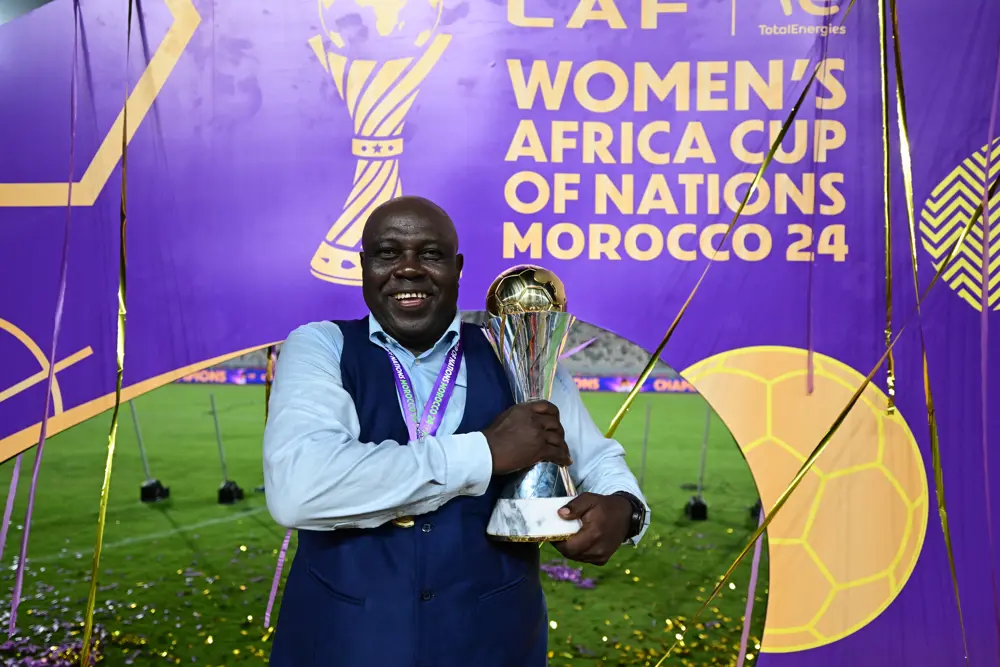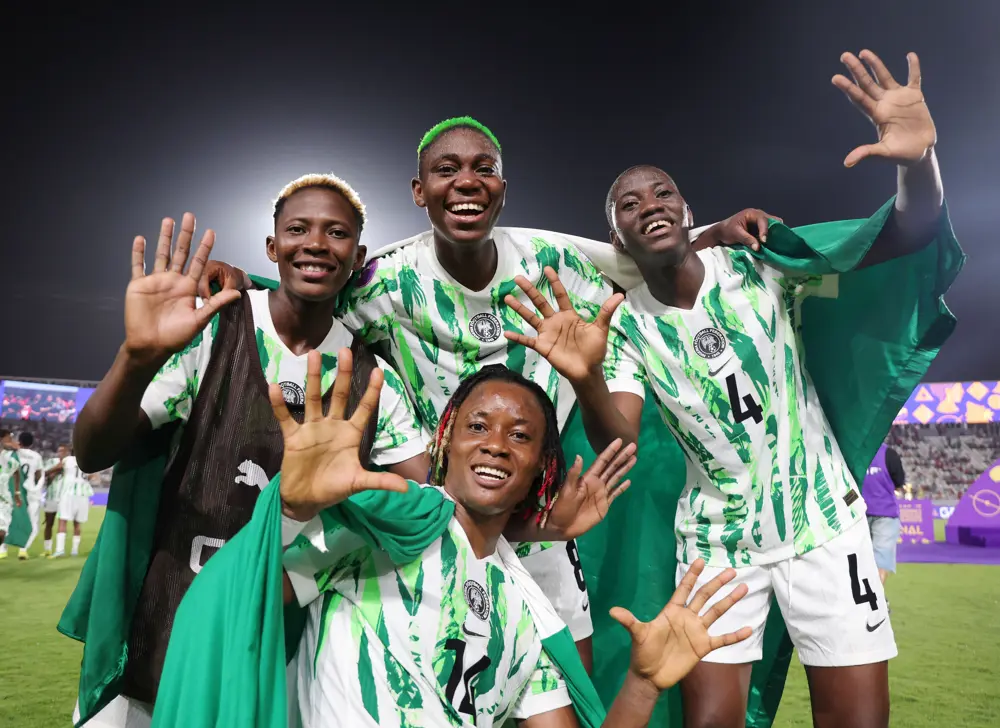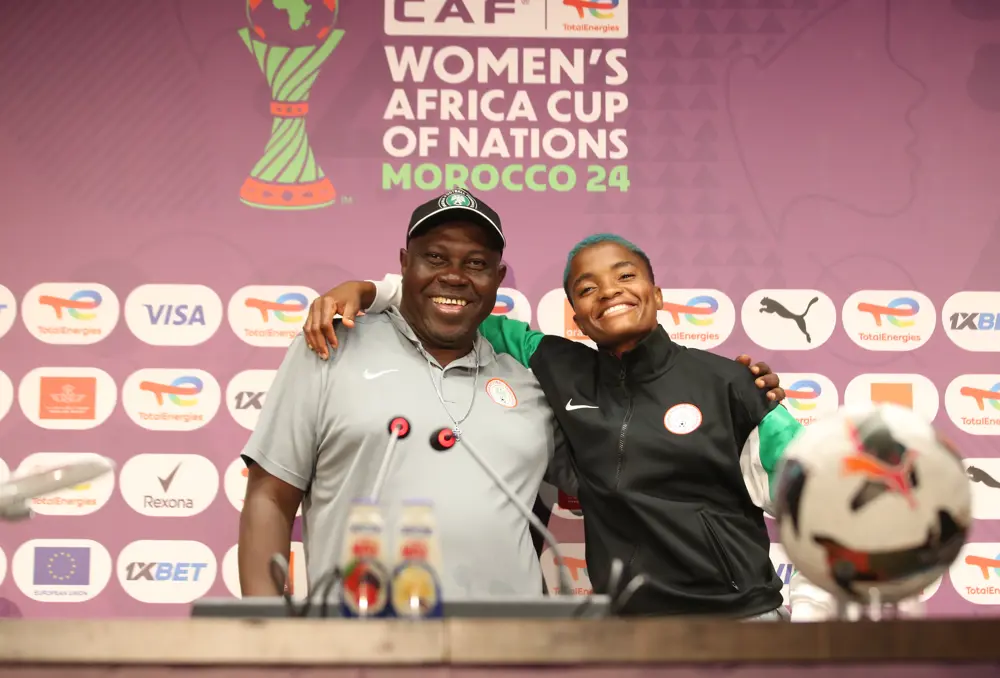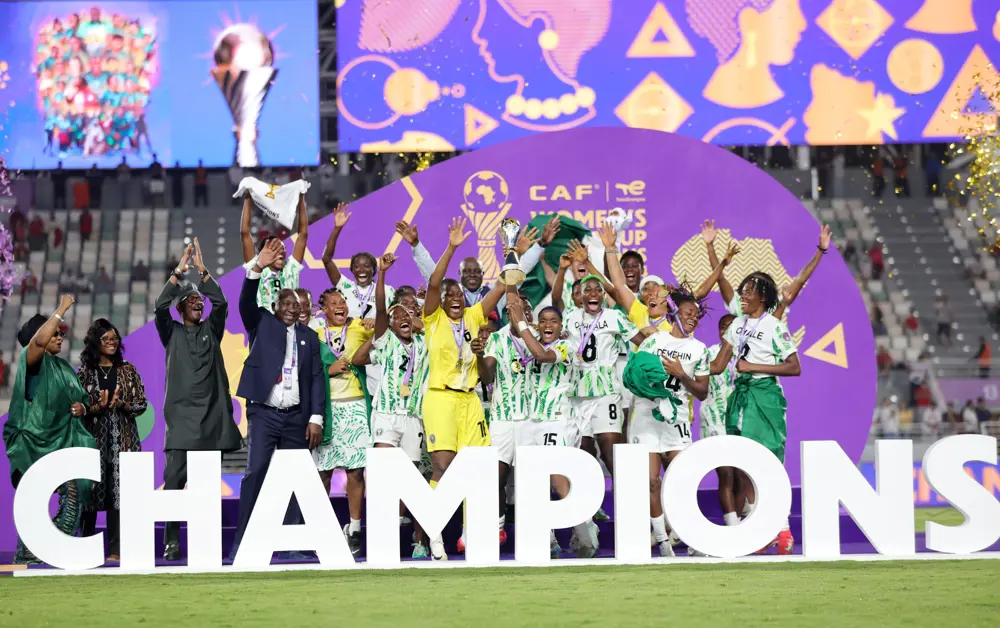Ever-smiling Justin Madugu has emerged as a national hero following the Super Falcons’ dramatic victory at the 10th CAF TotalEnergies Women’s Africa Cup of Nations (WAFCON), where Nigeria staged a stunning 3-2 comeback against host nation Morocco. Despite the accolades, the seasoned tactician humbly credited the players for their resilience and determination in overturning the deficit in the final.
Madugu’s success in Morocco marked a significant milestone — his fifth WAFCON appearance, but first as head coach, having previously served as assistant in 2012, 2014, 2018, and 2022. The win was more than a football triumph; it symbolized a restoration of pride and a powerful statement about the potential of indigenous African coaches amidst the dominance of foreign tacticians.
“We must first give God the glory for making this great feat achievable,” Madugu told CAFOnline.com. “Of course, the players are the key actors. We knew we were representing all indigenous coaches back home. Our success reflects what Nigerian coaches are capable of.”

Madugu emphasized that the mission extended beyond winning a title — it was about restoring belief among homegrown coaches.
“From the beginning, we understood the stakes. It wasn’t just about the team; it was about setting a benchmark for Nigerian coaches who had lost hope. We weren’t just representing ourselves,” he said. “I believe this achievement will open doors for Nigerian coaches at all levels. It’s about changing perceptions and proving we can compete — and win — at the highest level.”
For the 61-year-old coach, the victory was the culmination of decades of grassroots dedication and unwavering belief.
“I started from the grassroots — YSFON tournaments, coaching boys, encouraging girls who were turned away from fields,” he recalled. “In the early ’90s, we went to Brazil for youth tournaments. That was the spark. We built Makwada Queens from scratch and organized local tournaments to help players grow.”
“It wasn’t easy. People laughed. I was a civil servant, coaching both men’s and women’s teams while juggling office work. But I believed in something bigger. God gave me the gift to read and analyze matches, even before I understood what that meant.”

Many of the girls Madugu mentored in Adamawa have gone on to represent Nigeria, including Francisca Ordega, Sarah Nnodim, Loveth Ayila, and Lola Philip — all products of his system.
Leading a transitional team with 11 tournament debutants, Madugu showcased exceptional man-management, tactical flexibility, and belief in his players.
“We had limited time with the team, mostly during FIFA windows. So, much of the work was done off the pitch — one-on-one talks, group sessions, tactical discussions,” he explained. “We simplified everything. Theory before training, execution during training.”
“We studied Morocco thoroughly. They used different formations throughout the tournament. My training in match analysis helped. The final demanded mental strength and trust in the players’ adaptability.”
Strategic decisions, such as pairing Esther Okoronkwo and Chinwendu Ihezuo, were the result of experimentation during the group stage, leading to a stable setup by the knockout rounds.
Facing Jorge Vilda — fresh off a FIFA Women’s World Cup win with Spain — was a formidable challenge, but Madugu remained unfazed.

“He’s a high-profile coach. For us to come here and beat him? That’s commendable,” Madugu smiled. “But it wasn’t about him. We focused on our players. Morocco had the crowd and momentum. Going 2-0 down in the first half was our biggest test.”
“We believed in ourselves. We knew things weren’t working and had to switch to Plan B — and it worked. The players’ mental resilience carried us.”
Madugu’s coaching philosophy goes beyond tactics. For many players, he is a mentor, father figure, and confidant.
“You’re not just coaching footballers — you’re shaping lives. These young women come with dreams, struggles, and emotions. We play the role of parents too,” he said. “Discipline was non-negotiable, but we created an atmosphere of trust and growth.”
“Some of the players have been with me since the U17 and U20 levels. We’ve built a relationship rooted in care, structure, and guidance,” said Justin Madugu. “They come to me for advice beyond football — it’s personal. That unity was evident on the pitch.”
“When players believe in your vision, magic happens. That’s exactly what we witnessed in Rabat.”
Madugu’s impact has not gone unnoticed. From former coaches to football administrators and colleagues, the consensus is clear: he represents a new era in African coaching.
“Madugu is intense, structured, and deeply focused,” said former Nigeria U20 coach Christopher Danjuma in an interview with CAFOnline.com. “He embodies what an African coach should be — tactically astute, mentally resilient, and forward-thinking.”
Mansur Abdullahi, Assistant General Secretary of the Nigeria Football Coaches Association, echoed the sentiment: “His win means everything for indigenous coaches. He’s been part of the system since 2008. This is our time.”
Even former Super Falcons coach Thomas Dennerby, who worked with Madugu during the 2018 WAFCON campaign, offered high praise: “He’s a good and bright guy. I had a great time working with Justine. I’m not surprised at all. He made the players believe — and that’s what great coaches do.”
Looking ahead, Madugu is focused on building a sustainable future for Nigerian women’s football.

“Our long-term goal is to close the gap with the world’s best,” he said. “That means better structures, improved facilities, and more robust scouting. We should be able to field a Team A, B, and even C — that’s what global football powerhouses do.”
He also emphasized the need for coach development: “We want more exposure and capacity building for our coaches. Let them go on attachments abroad, learn from different football cultures. That’s how we grow.”
With another international fixture scheduled for October, Madugu hopes to organize a training camp to assess new talent and continue the team’s transition.
Despite his rising profile, Madugu remains grounded. For him, coaching is a calling, not a quest for titles.
“The future? That’s up to the Federation,” he said modestly. “I’m focused on delivering wherever I’m asked to serve. It’s not a do-or-die affair.”
“Nigeria belongs to all of us. If there are ideas to improve the team, let’s listen. Let’s work together. God gave me this gift, and I’ve allowed Him to lead me. From sneaking out of camp to coach boys, to lifting Africa’s biggest prize — this journey is divine.”
Madugu’s unbeaten run at WAFCON 2024 is a defining moment for Nigerian and African women’s football. Beyond lifting a trophy, he elevated the status of local coaching — proving that excellence knows no passport.
Culled from CAFonline.com


